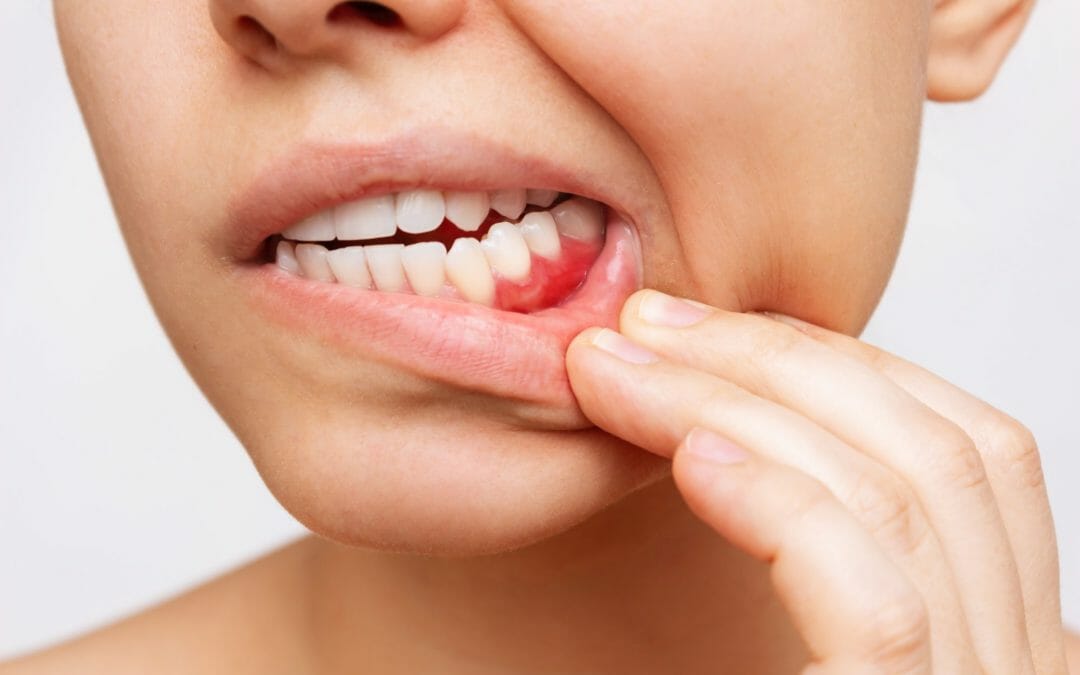Periodontal disease (also called gum disease) is a bacterial infection of the gums that occurs when plaque and tartar accumulate on the surfaces of the teeth and force the gums away. This creates pockets where harmful bacteria thrive, leading to periodontal disease.
Periodontal disease, of course, causes local issues in the mouth, threatening the health of a person’s teeth, gums, periodontal ligaments, and jawbone. Left unaddressed, periodontal disease can lead to persistently bad breath, tooth decay, gum recession, swollen and bleeding gums, tooth sensitivity, loose teeth, bite changes, tooth loss, and bone degeneration.
What many people do not realize is that periodontal disease can also have a significant impact on a person’s overall health and the health of other systems throughout the body.
How Can Periodontal Disease Impact General Health?
If you weren’t aware that periodontal disease can harm a person’s overall health, you’re not alone. It’s not immediately obvious how an infection occurring inside the mouth could be harmful to the rest of the body. Although the infection is located inside the mouth, the bacteria can still affect the rest of the body by weakening a person’s immune system and also by traveling throughout the body via the respiratory system and the bloodstream.
7 Systemic Health Problems Linked to Periodontal Disease
1. Respiratory Infections
With an elevated level of bacteria in the mouth, the chances of inhaling harmful bacteria increase. This results in an increased likelihood of developing infections of the respiratory system, such as pneumonia.
2. Diabetes
Periodontal disease is linked to diabetes in two ways. Individuals with diabetes are at an increased risk of developing periodontal disease because of the increased levels of glucose (sugar) in the blood which feeds bacteria (including the bacteria responsible for periodontal disease). Individuals who do not have diabetes but develop periodontal disease are also at an increased risk of developing diabetes because periodontal disease can also cause a person’s blood sugar levels to rise.
3. Heart Disease
Heart disease refers to several different conditions that affect a person’s cardiovascular system (the heart, blood vessels, arteries, and blood). The actual link between periodontal disease and heart disease (cardiovascular disease) is not fully understood. However, it is clear that individuals with periodontal disease are at an elevated risk for developing cardiovascular disease. Conversely, individuals with cardiovascular disease are much more likely to develop periodontal disease.
4. Dementia
Dementia is a condition marked by the impairment of various brain functions such as memory and judgment. Causing loneliness, depression, anxiety, and other negative symptoms, dementia affects a person’s ability to function normally, remember things, interact socially, and more.
Recent studies have shown that adults with periodontal disease are at a higher risk of developing dementia and suffering the characteristic cognitive decline as a result.
5. Rheumatoid Arthritis
As with cardiovascular disease, the link between rheumatoid arthritis and periodontal disease is not yet well understood, but it is very clear that there is a link. Individuals with rheumatoid arthritis are two times as likely to have periodontal disease than those without rheumatoid arthritis. While only 28% of individuals without rheumatoid arthritis have periodontal disease, 65% of individuals with rheumatoid arthritis also have periodontal disease. Plus, the periodontal disease tends to be much more severe in individuals who also have rheumatoid arthritis.
6. Certain Cancers
Periodontal disease has also been linked to an increased risk of both esophageal cancer and gastric cancer, increasing an individual’s risk by 43% and 52% respectively.
7. Reproductive Problems
Periodontal disease can also have a negative impact on both men’s and women’s reproductive health. On average, women with the periodontal disease take longer to conceive. They are also at a higher risk of premature birth and have infants with low birth weight.
Periodontal disease can also affect men’s reproductive health, as it can impact sperm health, count, and motility.
Can Periodontal Disease Be Treated?
In its earliest stage, gingivitis, periodontal disease can be reversed with careful, thorough, and persistent oral hygiene at home and at the dental office. Once periodontal disease has become more advanced, it cannot be completely cured, but it can be managed with regular professional cleanings and additional treatment approaches such as scaling and root planing, more frequent dental cleanings, antibiotic dental trays, and surgery (in the most severe cases).
How to Prevent Periodontal Disease
As with most health concerns, the best treatment for periodontal disease is prevention which helps individuals avoid developing it in the first place. The best way to prevent periodontal disease is with excellent oral hygiene practices.
In addition to flossing at least once a day (twice is better), you should brush your teeth for two minutes twice a day, using a toothpaste formula approved by the American Dental Association. If you are at an elevated risk for developing periodontal disease, our dentist might also recommend rinsing with an antibacterial mouthwash each day.
In addition to caring for your teeth at home, you should visit the dental office at least once every six months for professional teeth cleaning and a dental exam.
Periodontal Disease Prevention and Treatment in West Bend
At Dentistry of West Bend, our dentist, Dr. Jared Harding places a strong emphasis on preventive care for all of our patients. We strive to help each patient prevent periodontal disease from developing. In some cases, however, individuals are at an increased risk and prevention is not possible. In these cases, we work closely with patients to help them manage their periodontal disease to stop it from worsening, spreading, or harming their systemic health.
To learn more about periodontal disease or to schedule a dental exam with Dr. Harding, we welcome you to contact Dentistry of West Bend today.


Recent Comments